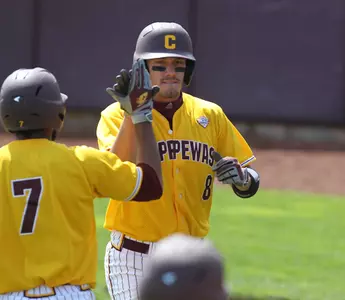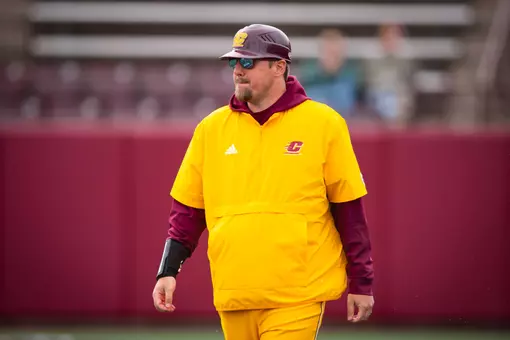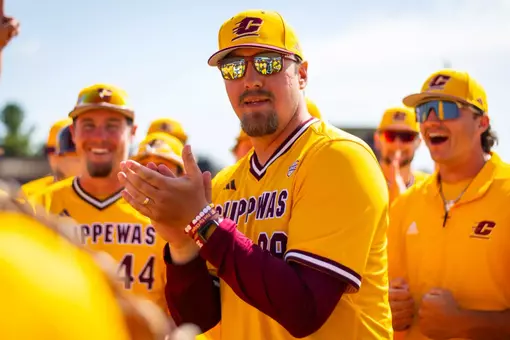Central Michigan University Athletics

Decision Looms for Huntey
6/5/2014 12:00:00 AM | Baseball
June 5, 2014
MOUNT PLEASANT, Mich. - Tyler Huntey is hoping his phone rings some time in the next three days.
If he gets the anticipated call, Huntey will face a decision that will forever change the course of his life: Sign with a Major League Baseball team or remain in Mount Pleasant and play one final season with Central Michigan.
For Huntey, and any other college player who is draft eligible and harbors legitimate hopes of actually being selected, it's both exciting and stressful.
Huntey, who is an internship away from graduating with a degree in business management, put himself on the radar of major league teams with a standout junior season in 2014.
As the Chippewas' catcher, Huntey hit a team-best .329 with five home runs and 51 RBI. He also had three triples and 10 doubles, finished with a .460 slugging percentage, and was among the top three on the roster in virtually every important offensive category.
He earned second team All-Mid-American Conference honors and would, if he decides to return to CMU, be considered one of the league's top players heading into the 2015 season.
The dilemma? If Huntey doesn't sign with a major league organization this year, he runs the risk of not being drafted in 2015 if he doesn't produce for CMU like he did this spring.
And, a player with remaining college eligibility can use that fact as leverage in negotiating a signing bonus with a major league team. One who has exhausted his college eligibility doesn't have such leverage.
On the other hand, Huntey could return to CMU, post numbers similar to those he put up in 2014, and go even higher in the draft than he might this season. And the higher the draft pick, the bigger, generally, the signing bonus.
That Huntey is in position to even consider the question is somewhat remarkable considering where he was just 12 months ago.
As a freshman in 2012, Huntey split time behind the plate and hit a solid .271 with two home runs and 16 RBI. He slumped to .194 in 2013, starting less than one-third of the Chippewas' games.
"I think the pressure of being the starting catcher got to me a little bit," Huntey said in reflecting on his 2013 campaign. "Instead of just relaxing and playing the game, I overthought a lot of things.
"It was frustrating because I knew that if our team was going to be good I was going to have to be somebody who had to preform. I just put too much pressure on myself. It took me to hit rock bottom last year before I realized that it's the same game, I've been playing it my whole life, and trying to do too much doesn't work in baseball."
Between the 2013-14 seasons, coach Steve Jaksa laid out a plan for Huntey, much of it involved shortening his stride at the plate. Fully buying into what the coaches were trying to accomplish was a big step, Huntey admits, and one he had to reconcile in his mind before moving forward with a rigid off-season regimen.
Huntey began the 2014 season in the bottom third of the batting order, then moved to fifth and, finally, to third, the spot that traditionally goes to a team's best all-around hitter.
And he delivered, raising his average .135 points from the previous season and earning the Chippewas' co-most valuable player award.
"He made those changes that he needed to make," Jaksa said. "We can call that growing up, we can call that maturity or call it whatever we want. But the bottom line is he did it.
"It's been a world of difference not only in how he's played, but in what he's come to."
That fact that Huntey can now count a team MVP award and two - yes two - most improved player awards in his cache is telling about the roller-coaster he has ridden and how far he's come since arriving in Mount Pleasant in the fall of 2010 after a standout three-sport career at Morley Stanwood High School.
"He's a guy who can say `Hey I've lived it, I understand, I've been there' because he's had his time where he red-shirted and didn't play, then he did play quite a bit, and then he didn't play quite a bit," Jaksa said. "He went through all of that emotion, and I think he's wise enough to understand and reach out to a teammate that's in need and be able to talk to him about things. There's nothing like having been there. He understands it."
Huntey also has gained from being in the unique position of following in the footsteps of one of CMU's all-time greats, Clark Huntey, his father.
The elder Huntey, now an elementary principal/athletic director in the Morley Stanwood Community Schools, was a third team All-American and the Mid-American Conference player of the year in 1989. His 38 career home runs rank third on the school's all-time list, and he went on to play briefly in the San Francisco Giants organization.
The natural assumption is that the father led and that the eager-to-please son followed. But that, Tyler said, wasn't the case. Clark never pressured Tyler into anything athletically, and the father never let on just how good he was in his day. Tyler's one-time hitting instructor, Bryan Barr, had played against Clark when Barr was at Western Michigan.
"He (Barr) couldn't say enough about how good a hitter, how good a baseball player my dad was," Tyler said. "Wherever I went, somebody always had a story about him. My dad never said anything about stuff like that to me."
Verbal instruction and guidance came at a minimum, Tyler said.
"He mostly let me figure it out for myself," he said. "He'd say maybe something little, like `You're pulling off your front shoulder.'
"Mostly he'd let me figure out how to do things where I was comfortable, and he didn't try to force anything on me. He never once made us play any sport. It was always our choice, what we wanted to do.
"He never wanted me to compare myself to him. He never wanted to put that kind of pressure on me. He always wanted me to make my own path."
And that, of course, is almost never the path of least resistance, but the one that must be traversed to come to the full realization of who you are, to become a man. It's a step-by-step process, and sometimes those steps are painfully and frustratingly backward. But with work, and perseverance, one gets there, eventually.
"I know if I didn't go through this, I wouldn't be the baseball player I am right now," Huntey said. "I appreciate the opportunity that I have and I'm going to make the most of it, all the time.
"It's almost hard to explain how much you mature not only as a ballplayer, but as a person, from (age) 18-22. You get your priorities straight. You start realizing that after this you have to start making decisions. Your dreams are coming up on you."






